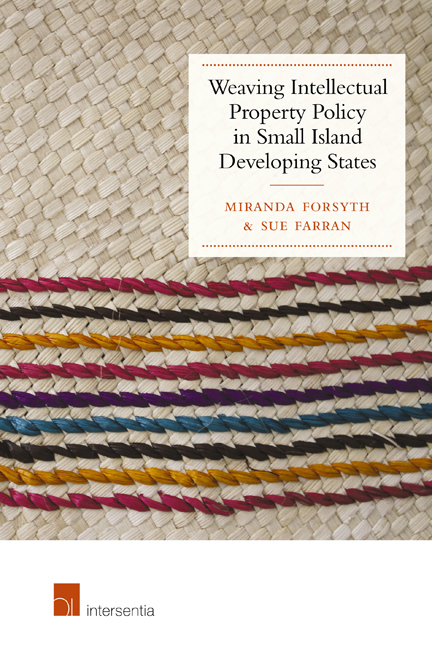Book contents
- Frontmatter
- Dedication
- Acknowledgements
- Contents
- List of Tables
- Introduction
- Chapter 1 Intellectual Property and Development: The Issues Viewed through a Pacific Islands Prism
- Chapter 2 Health and Issues of Access to Medicine
- Chapter 3 Access to Educational Resources
- Chapter 4 Problems with Importing the Global Intellectual Property Regime into Pacific Island Countries: Learning from Land
- Chapter 5 Setting Out a New Approach to Intellectual Property and Development
- Chapter 6 Intellectual Property and Technological Innovation in Pacific Island Countries: The Example of Sustainable Sea Transport
- Chapter 7 Branding, Certifying and Authenticating in Pacific Island Countries
- Chapter 8 The Regulation of Traditional Medicinal Knowledge in Pacific Island Countries
- Conclusion
- About the Authors
Chapter 3 - Access to Educational Resources
Published online by Cambridge University Press: 22 November 2017
- Frontmatter
- Dedication
- Acknowledgements
- Contents
- List of Tables
- Introduction
- Chapter 1 Intellectual Property and Development: The Issues Viewed through a Pacific Islands Prism
- Chapter 2 Health and Issues of Access to Medicine
- Chapter 3 Access to Educational Resources
- Chapter 4 Problems with Importing the Global Intellectual Property Regime into Pacific Island Countries: Learning from Land
- Chapter 5 Setting Out a New Approach to Intellectual Property and Development
- Chapter 6 Intellectual Property and Technological Innovation in Pacific Island Countries: The Example of Sustainable Sea Transport
- Chapter 7 Branding, Certifying and Authenticating in Pacific Island Countries
- Chapter 8 The Regulation of Traditional Medicinal Knowledge in Pacific Island Countries
- Conclusion
- About the Authors
Summary
INTRODUCTION
In the previous chapter we focused on the negative impact that the law of patent can have on access to medicine and consequently on health in Pacific islands, thus undermining several Millennium Development Goals. We pointed out through the case study of Vanuatu that the impact of stricter patents regimes may not be felt immediately, but that various changes of circumstances could give rise to far-reaching consequences. We now turn to the impact that intellectual property has on access to education, focusing in particularly on the law of copyright. Unlike patent laws, copyright is already creating difficulties for Pacific island states, because, unlike with patents, there are clear local groups that stand to gain from an effective copyright system. For example in Cook Islands the Copyright Act which was introduced in 2013 was the result, among other factors, of pressure from songwriters and musicians. Similarly, elsewhere in the region such as in Vanuatu, Solomon Islands and Papua New Guinea, it has often been songwriters and musicians who have been vocal in claims of copyright infringement and in demands for stronger protection for their creative efforts. In Vanuatu for example, the Musik Federesen Blong Vanuatu (Music Federation of Vanuatu) was set up and motivated by the actions of the owner of one of Vanuatu's major recording studios. The federation campaigned for a number of years for the government to gazette, and hence bring into operation, Vanuatu's Copyright Act which had been sitting on the statute books since 2002. The argument was made that local musicians were losing out on major royalty payments because their music was being copied and sold cheaply in local stores, and also was played on radio and television without any benefits being paid to the artists. There are also groups who may benefit from weak copyright systems, for example those who simply cannot afford to pay the price copyrighted material commands, and those for whom weak copyright regimes may have commercial advantage. It is also the case that within the development context national governments are under pressure to tighten copyright laws and regional organisations are keen to do so as part of the promotion of cultural industries.
- Type
- Chapter
- Information
- Publisher: IntersentiaPrint publication year: 2015



